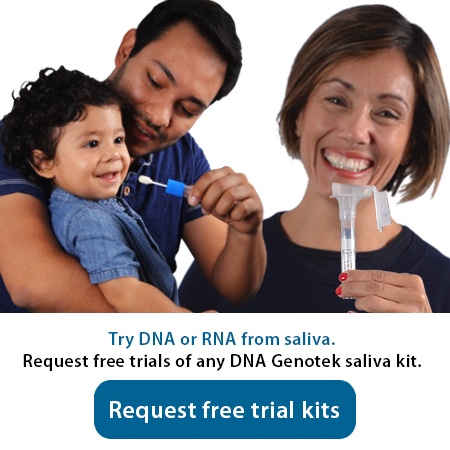2014-12-02
 Everyone at DNA Genotek is familiar with event-based collections. We’ve worked with dozens of customers over the years to help facilitate collecting samples for breast cancer, epilepsy, HLA-typing and more. Recently, our products were used in an event-based collection to support education and provide information on how genes are linked to our ancestry. The New Horizons Festival (NHF) was held at Erasmus MC and several other public locations in Rotterdam, the Netherlands on September 26, 2014 and over 1,500 people participated. The purpose of the event was to make science accessible and attractive to the general public by merging science with art and music to create a fun, interactive event.
Everyone at DNA Genotek is familiar with event-based collections. We’ve worked with dozens of customers over the years to help facilitate collecting samples for breast cancer, epilepsy, HLA-typing and more. Recently, our products were used in an event-based collection to support education and provide information on how genes are linked to our ancestry. The New Horizons Festival (NHF) was held at Erasmus MC and several other public locations in Rotterdam, the Netherlands on September 26, 2014 and over 1,500 people participated. The purpose of the event was to make science accessible and attractive to the general public by merging science with art and music to create a fun, interactive event.
The NHF was one of the 45 events on the occasion of the yearly European Researchers Night 2014 which allows the public to discover what researchers really do and why it matters in their daily lives. During the event, the public has access to behind-the-scenes guided tours of research labs, interactive science shows, and hands-on experiments or workshops.
The theme of the NHF in Rotterdam this year was ‘Big data, your life in the cloud’, relating to major developments in research where emerging technologies are resulting in tremendous amounts of data, demanding for new interpretive methods and ethical decisions surrounding deeper knowledge. The audience, aged between 17 and 37 years old, had the opportunity to meet with researchers from the various scientific disciplines of Erasmus University Rotterdam, Delft University of Technology and Leiden University. The researchers demonstrated the possibilities of using big data in their respective disciplines of biology, medicine, economy, marketing, and logistics.
DNA analysis for the public
With the joint sponsorship of DNA Genotek and Illumina, the festival offered event participants the unique chance to have their DNA analyzed to determine their bio-geographic ancestry, while also supplying the events’ researchers with new data for future genomic research.
Nearly two hundred individuals participated in a saliva-based DNA collection using Oragene/saliva self-collection kits during the festival. Participants were asked to donate 2 ml of saliva into an Oragene/saliva kit. Once complete, the participants closed the cap on the Oragene/saliva kits to release a preservative chemistry to stabilize their DNA at ambient temperature. In addition, the participants completed a consent form, filled in a questionnaire and provided a photograph. The collection with Oragene proved to be one of the most popular initiatives in the entire program continuing on until 2:00 am. Genetic analyses will be later conducted by the Department of Forensic Molecular Biology of Prof. Manfred Kayser in collaboration with the High-Throughput Human Genomics Facility of Professor André Uitterlinden, both affiliated with Erasmus MC. When the analysis is complete, each participant will receive a report via e-mail highlighting their most likely geographic region of genetic ancestry.

The collected data will also be used for genomic research purposes at Erasmus MC such as in Professor Kayser’s department of Forensic Molecular Biology which focuses on understanding the genetic basis of human appearance, bio-geographic ancestry and mapping the genetic history of human populations. For the full program of the year’s NHF, please click here.
We think this is a fascinating way to introduce the concept of genetics to the general population and its link to ancestry and human history. The Oragene/saliva collection kit is an ideal way to collect samples needed to show the power of genetics in an easy-to-use and non-invasive way.


